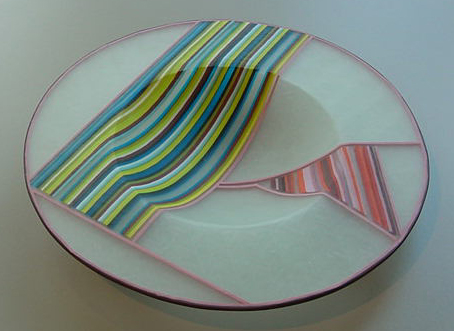Klaus Moje

My geometric garden, 1984, fused, kiln-formed and ground mosaic glass
Cultural background:
Both parents were born in Hamburg, Germany
Place of origin:
Hamburg, Germany
Start of migration journey:
Hamburg, Germany - August 1982
Place of arrival in Australia:
Sydney, NSW - August 1982
First home in Australia:
Watson, ACT
Initial employment in Australia:
Founding Head of Glass Workshop and Senior Lecturer - Canberra School of Art, Australian National University
Other employment in Australia: Freelance artist since 1992
Any glass related objects that you brought with you? And still have?: He brought quite a number of tools and glass related objects, most have been given to Australian public collections.
Klaus' story
At the age of fifteen Klaus Moje commenced a three year apprenticeship as a glass cutter and grinder at the family workshop in Hamburg. The business belonged to his father who worked with mirrors and grinding techniques doing edges and facets. When Klaus' apprentice contract was completed he received a Journeyman's Certificate. After completing five years as a journeyman, Klaus was qualified for application to a Masters Course, undertaking his studies at the Rheinbach & Hadamar glass schools.
In 1982, Klaus received a telephone call from the then Director of Canberra School of Art, Udo Sellbach, asking if he would be interested to establish a Glass Program at the Canberra School of Art. He accepted the position with the provision to limit his involvement to ten years after which he intended to go back to his own practice. That same year Klaus arrived in Australia together with his wife, the ceramicist Brigitte. The program that he started was different to anywhere else in the world because it was not focused on the hot-glass workshop. This is one of the reasons why Canberra School of Art has become so well known around the world, as Klaus applied a quality to glass that was not seen at that point in other educational programs.
Klaus has visited and taught at Pilchuck Glass School in the United States of America since 1979. One of the first things that he achieved when he arrived in Canberra in establishing the glass program was to approach the Australia Council with a view to creating a scholarship for Australian students to attend workshops at Pilchuck. This was something unknown at the time as the Australia Council was not funding educational programs of this nature. The Council agreed however to open up two scholarships per year and for quite a long stretch of time. This program enabled a student to attend Pilchuck classes to gain professional and personal experience within the international glass community whilst acquiring an international knowledge of the medium, enabling students to pass this knowledge on to other students on their return to Australia.
Klaus and Brigitte have twin sons, Amos and Danilo. Amos has been enrolled at Canberra School of Art and continues to work with glass. About seven years ago Brigitte and Klaus relocated their studios from Canberra to Wapengo near Tanja on the South Coast, where they currently reside and continue their practice. Mascha, Klaus' daughter from a previous marriage arrived in Australia in 2004, studied silversmithing at the Canberra School of Art and is working and teaching in Melbourne.
Klaus received the Australian Creative Fellowship, known as the Keating Award in 1995, which was an excellent succession to the completion of his appointment at the Canberra School of Art. Among others, two outstanding awards Klaus has received were the Life-Time Achievement Awards from the Glass Art Society (2000) and Urban Glass (2004), both in the USA.
Last year Klaus was decorated with an honoury AO (Order of Australia). This is unusual as he is still not yet an Australian citizen. Klaus still has commitments to Germany but has had his greatest successes here in Australia, especially through development of his own techniques used in his teaching and practice. As Klaus sees it, the dual citizenship he intends to apply for would be ideal.
Klaus' experiences with Australia have been absolutely ENRICHING, and he feels this country has rewarded him in
wonderful ways - for what he has achieved and for others who have helped him. He has enjoyed the wave of his success and his interactions with other practitioners and educators along the way. It has been very satisfying for Klaus to see a LARGE number of his talented students taking up outstanding positions in the glass industry nationally as well as internationally.
Klaus is happy to see the glass movement evolve in this country over the last twenty years. "The Australian glass scene has found its place on the international stage not because we do the same here that is practiced elsewhere, but because we went for something new, something different. Being part of this development is filling me with pride and awareness that only the group, not the individual can change the flow of the river."